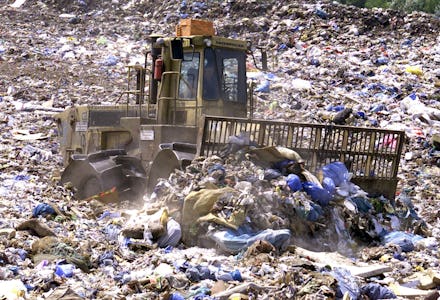This weird new bacteria will eat our toxic plastic

Humans produce over 300 million tons of plastic waste each year. According to the UN, that’s roughly the weight of the entire global population. A lot of plastic! But a new study published today in the journal Frontiers in Microbiology reports that German scientists have discovered a plastic-eating bacteria that may help us deal with the stuff in the decades to come.
The problem with plastic isn't just the amount that we produce, but how hard it is to get rid of. Polyurethane, a plastic used in kitchen appliances, buildings, footwear, and more, is especially difficult to recycle or destroy, meaning it often ends up in landfills. But now, that may be changing. In the report, the researchers outlined their discovery of a new strain of Pseudomonas bacteria that is not only capable of breaking down polyurethane, but using those compounds as its fuel.
Although there is still a lot to learn about the weird new plastic-eater, Dr. Hermann J. Heipieper, a senior scientist at the Helmholtz Centre for Environmental Research-UFZ in Leipzig, Germany and co-author of the new paper, said "This finding represents an important step in being able to reuse hard-to-recycle PU products."
A key issue with polyurethane comes from it mostly being made of thermosetting polymers that do not melt, according to EurekaAlert!. Once in the landfill, the plastic can release toxic and sometimes carcinogenic chemicals. Perhaps unsurprisingly, researchers discovered the new bacteria in a landfill.
Organisms developing the ability to break down plastic isn't a shock to scientists. There are already caterpillars out there that can digest and survive off of it. And Heipieper told the Guardian, "When you have huge amounts of plastic in the environment, that means there is a lot of carbon and there will be evolution to use this as food. Bacteria are there in huge numbers and their evolution is very fast."
This bacteria isn't going to solve the world's plastic problems, though. It could take a decade before it can be used at a large scale, and if humans continue to produce plastic waste at our current rates, we would need a whole lot of bacteria ten years from now.
It's a viewpoint shared by Heipieper, who told the Guardian, "This certainly doesn’t mean that the work of microbiologists can lead to a complete solution. The main message should be to avoid plastic being released into the environment in the first place.”